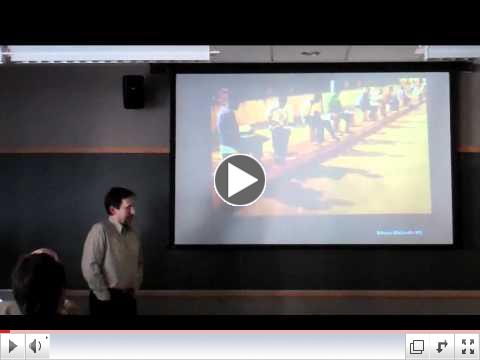|
|
|
Nicholas Institute for Environmental Policy Solutions -February 6, 2012
|
|
|
February 10
Durham, North Carolina
Symposium
The Institute's Ryan Bartlett will moderate a panel at the symposium "Water and Energy: Improving Access Through Small Scale Solutions."
February 22-24
Capella, Singapore
Conference
Ocean and Coastal Policy Director Linwood Pendleton will be among the speakers at The Economist's World Oceans Summit.
March 29
Durham, North Carolina
Lecture
Gabrielle Dreyfus from the U.S. Department of Energy will be the third speaker in our Spring 2012 Seminar Series.
For more information on upcoming events, visit the Nicholas Institute's website.
|
 | |
Andrew Revkin: Which Comes First, Peak Everything or Peak Us?
|
|
|
Get updates as they happen through Nicholas Institute social media:
  
|
|
|
|
|
Climate Change Threatens Calif. Economy
 Climate change is likely to harm California's economy by reducing the types of natural, non-irrigated vegetation available for livestock forage and the ability of forest ecosystems to store carbon dioxide, according to a peer-reviewed study by Duke and six other institutions published in the scientific journal Climatic Change. It concludes that, whether the state's climate becomes warmer and wetter or warmer and drier, it will be more expensive to raise cattle because there will be less forage to sustain the animals. Listen to Pendleton and his co-author discuss the study on Jefferson Public Radio Feb. 7, 9 a.m. PST/noon EST. Climate change is likely to harm California's economy by reducing the types of natural, non-irrigated vegetation available for livestock forage and the ability of forest ecosystems to store carbon dioxide, according to a peer-reviewed study by Duke and six other institutions published in the scientific journal Climatic Change. It concludes that, whether the state's climate becomes warmer and wetter or warmer and drier, it will be more expensive to raise cattle because there will be less forage to sustain the animals. Listen to Pendleton and his co-author discuss the study on Jefferson Public Radio Feb. 7, 9 a.m. PST/noon EST.
|
|
Spring 2012 Seminar Series Kicks Off
Join the Nicholas Institute for Environmental Policy Solutions and the UPEP Environmental Institution Fridays at 10 a.m. for a seminar series featuring leading experts discussing a variety of pressing environmentally focused topics.
|
|
Effects of Alternative Biofuel Mandates
A new study by Duke University and others describes the global greenhouse-gas-emissions and nitrogen-use impacts of the United States Renewable Fuel Standard.
|
|
Group to Tackle Climate Policy Issues
Ensuring a climate policy can be sustainable means fully understanding its costs, benefits and potential impacts on existing policies. A new working group at Duke University is poised to help stakeholders better answer these and other questions.
|
|
Report: Green Economy in a Blue World
A new report, featuring contributions by a Nicholas Institute researcher, provides concrete examples of how emerging ocean industries can become more profitable, more sustainable, and meet the needs of a growing population without sacrificing the health of the world's fragile ocean ecosystems.
|
|
Looking at Blue Carbon, Globally
Preserving and restoring coastal habitats, such as mangroves and salt marshes, could be an important step to curbing climate change. Two Nicholas Institute researchers are among the members of the International Blue Carbon Policy Working Group, tasked with addressing the global significance of climate change mitigation through the protection of these carbon-storing habitats.
|
|
Mitigating Emissions on U.S. Public Land
A new Institute study, featured in the journal Environmental Management, answers questions about whether and how sequestration and emissions reductions on federal and state land could be incorporated into climate and offsets policy.
|
|
Job Opening: Development
Have an eye for detail, excellent communication skills and interest in policy-oriented environmental research? We have an opening on our development team.
|
|
Reducing the Cost of CCS Technology
An article in the journal Environmental Science and Technology, co-authored by a Nicholas Institute for Environmental Policy Solutions researcher, looks at an alternative to reduce the operating costs of amine-based carbon capture and storage (CCS) systems.
|
|
The Nicholas Institute for Environmental Policy Solutions helps decision makers create timely, effective, and economically practical solutions to the world's most critical environmental challenges.
|
|
|
|
|
|
|
|
|
|
Nicholas Institute for Environmental Policy Solutions, Duke University,
P.O. Box 90335, Durham, NC 27708.
|
|
|